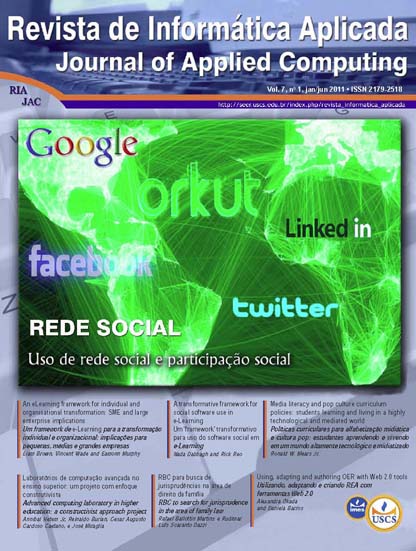Media Literacy and Pop Culture Curriculum Policies:Students Learning and Living in a Highly technological and Mediated World
DOI:
https://doi.org/10.13037/ria.vol7n1.1762Resumo
This paper discusses digital content and digital use policies as modern teachers and administrators are forced to grapple with sometimes contradictory recommendations from local, state and national organizations in terms of whether to embrace new media technologies in schools or to guard students from them. For example, the National Council for Teachers of English (2007), whose standards to promote 21st Century literacies and digital media use differ greatly from the thinking of some traditionalists who seek to protect students from popular content, or to limit use of popular devices. While some organizations embrace various media technologies as tools for learning, other individuals and organizations reject new pedagogical approaches that attempt to harness digital media technologies.These protectionists believe that media technologies often affect youth populations negatively because the media messages channeled by popular technologies often promote harmful, illegal or illicit activities. gender differences.Downloads
Referências
ALVERMANN, D., & HAGOOD, M. (2000). Fandom and critical media literacy. Journal of Adolescent & Adult Literacy, 43 (5), 436-446.
ALVERMANN, D., HUDDLESTON, A. & HAGOOD, M. (2004). What could professional wrestling and school literacy practices possibly have in common? Journal of Adolescent & Adult Literacy, 47 (7), 532-540.
BERLEY, M. (2000). Review: The Rise and Fall of English. Academic Questions, 13 (2), 82-86.
Darling-Hammond, L., & Bransford, J. (2005). Preparing teachers for a changing world. San Francisco: Jossey-Bass.
DEWEY, J. (1900). The school and society. University of Chicago Press: Chicago, IL.
FUHRMAN, S., COHEN, D., MOSHER, F. (2007). The state of education policy research. Mahwah, NJ: Lawrence Erlbaum Associates.
HERON-HRUBY, A., HAGOOD, M., & ALVERMANN, D. (2008). Switching places and looking to adolescents for the practices that shape school literacies. Reading & Writing Quarterly, 24, 311-334.
HOBBS, R. (1999). Teaching the Humanities in a Media Age. Educational Leadership, 56 (5), 55-58.
JOHNSON, J., JACKSON, L. & GATTO, L. (1995). Violent attitudes and deferred academic aspirations: Deleterious effects of exposure to rap music. Basic and Applied Social Psychology, 16, 27-41.
JONASSEN, D., HOWLAND, J., MARRA, R. & CRISMOND, D. (2008). Meaningful learning with technology. Pearson Prentice Hall: Upper Saddle River, NJ.
LANE, B. & GRACIA, S. (2004). State-level support for comprehensive school reform: Implications for policy and practice. Journal of Education for Students Placed at Risk, 10(1), 85-112.
NATIONAL COUNCIL OF TEACHERS OF ENGLISH. (2007). 21st century literacies: A policy brief produced by the National Council of Teachers of English. Urbana, Illinois.
ROBERTS, D., FOEHR, U. & RIDEOUT, V. (2004). Generation M: Media in the Lives of 8-18 year-olds. Kaiser Family Foundation.
SCHOLES, R. (1998). The rise and fall of English. Yale University Press: New Haven, CT.
SOLOMON, G., ALLEN, N. & RESTA, P. (2003). Toward digital equity: Bridging the divide in education. Boston: Pearson Education Group.
WISKE, M., FRANZ, K. & BREIT, L. (2005). Teaching for understanding with technology. Jossey-Bass: San Francisco, CA.
Downloads
Publicado
Edição
Seção
Licença
Direitos autorais (c) 2012 Ronald W. Mears Junior

Este trabalho está licenciado sob uma licença Creative Commons Attribution-NonCommercial-ShareAlike 4.0 International License.
Os autores que publicam trabalhos na RIA estão de acordo com os seguintes termos:
- Autores mantêm seus direitos autorais e concedem à RIA o direito à primeira publicação. Admite-se o compartilhamento do referido trabalho, desde que seja reconhecida sua autoria e publicação inicial nesta revista.
- Autores podem fechar contratos adicionais separadamente, para distribuição não exclusiva da versão do trabalho publicado na RIA, com reconhecimento de sua autoria e publicação inicial nesta revista.
- Autores podem publicar e distribuir seu trabalho online, antes ou durante o processo editorial.


